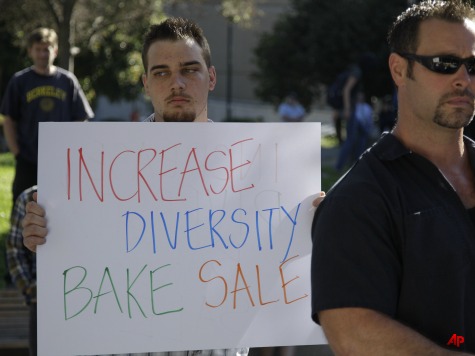
According to Bruce Shepard, president of Western Washington University (WWU), a university’s success is based not on its curriculum but on the color of its student body and faculty. In a school-wide questionnaire, the WWU community was asked, “How do we make sure that in future years ‘we are not as white as we are today?'”
As Kaitlyn Schalhorn writing at Campus Reform reports, Shepard’s question, which was asked in the communications and marketing department’s daily newsletter called Western Today, aims to help “improve Western Washington University’s adherence to its mission” as discussed by Shepard during his 2013 convocation address.
In that speech, Shepard discussed diversity, access to education, and the university’s place in a global economy. He also described WWU as a “selective and premier institution,” one whose “students are more likely to come from the upper middle class families where parents have gone to college.”
Shepard continued:
In Washington, where we draw 90 percent of our students, high school graduation numbers have recently declined. They are projected to now remain flat. Those flat lines mask a shift: the strata of high school grads from which we have traditionally drawn our students are shrinking; they are being replaced by those coming from different socioeconomic strata. How do we respond?
According to Shepard, the university’s response should begin with the WWU community’s replies to six critical questions, one of which asks how the university can become less “white.”
Shepard followed his convocation speech with a recent blog post on WWU’s website in which he defended his statement that the university will fail if it does not become less “white” in years to come.
“My word choice was intended to be provocative,” Shepard wrote, but then suggested another way to express his statement.
“In the decades ahead, should we be as white as we are today, we will be relentlessly driven toward mediocrity; or, become a sad shadow of our current self,” he asserted.
Shepard expressed significant concern about recent articles regarding the impact of demographic shifts. He cited warnings by a former director of the U.S. Bureau of the Census that universities that are currently mostly “white” would not survive.
“I am increasingly concerned about our understanding of the issues ahead, for that understanding must be pervasive in order to enable Western’s critically important capacity to then change,” Shepard wrote. “And change we must.”
As Campus Reform reports, Shepard has already made big changes:
Standard performance reviews at WWU have now become monthly sensitivity trainings in “heterosexual privilege,” and “gender privilege” according to one anonymous staff member.
The assemblies, called “[Dean of Students] Unit Cultural Competency Staff Meetings,” occur approximately once a month, according to an emailed schedule obtained by Campus Reform. Upcoming meeting topics include “gender privilege,” “heterosexual privilege,” “nationality privilege,” “language privilege,” and “intersectionality.”
“I felt I would be discriminated against based on my political and religious beliefs, and because I don’t believe the content of the meetings will reduce racism or other ‘isms’,” the WWU staff member told Campus Reform anonymously for fear of retribution. “The primary theme of the meetings makes people considered privileged feel guilty and minorities feel self-pity.”
“At the beginning of the Cultural Competency Staff Meetings several employees felt uncomfortable talking about sensitive racial topics, so we were told not to share conversations from the meetings outside of [them],” the anonymous staff member wrote in an email to Campus Reform. “Some people still didn’t feel comfortable so the Dean of Students said the meetings are optional if you don’t feel comfortable attending.”
In addition to the sensitivity training, WWU now provides training and guidance on topics such as “Recruiting and Retaining Faculty and Staff of Color.”
Despite some criticism, WWU Dean of Students Theodore Pratt said the overall feedback to his office has been positive. He indicated that the meetings are visited by “experts” on gender issues and other identified “isms” from the community or broader organizations to help train university employees.
At staff meetings, reading materials such as Robert Jensen’s “White Privilege Shapes the U.S.” and Alexander Stille’s “The Paradox of the New Elite” are also discussed.
“Whether it’s gender, religious preference or anything that might be a group that might be coming in that may feel like there isn’t enough understanding about them,” said Pratt, “we try to make sure that our staff are prepared as our population has diversified and that we’re prepared to help our staff best communicate with those groups and those individuals.”

COMMENTS
Please let us know if you're having issues with commenting.